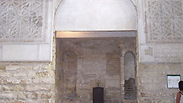
Spain's Córdoba, a Sephardic capital
Undeniable historic Jewish roots of city in region of Andalusia being heavily promoted by tourism board, attracting growing curiosity
But Córdoba's undeniable historic Jewish roots have been heavily promoted by the city's tourism board and attracting growing curiosity.
Video courtesy of jn1.tv
Córdoba is part of Spain's chain of destinations boasting rich Sephardic history. This city showcases a uniquely medieval Sephardic story.
"Córdoba is the capital of Sepharad," says Casa de Sefarad Museum Director Sebastian de La Obra. "For all those listening, the capital of somewhere is a place where everything concentrates both in history and in memory, everything important in both tangible and intangible heritage.
"We find ourselves in Córdoba, which boasts two undeniable characteristics: It's the capital of Andalusia's incredible and beautiful culture, but it's also our Sephardic capital, that is Jewish Spain."
Here, Jews thrived in trade, science and academia, under the tolerant Islamic rule of Rahman III during the 10th century. It was here too that the great thinker and medic Rambam was born.
Regimes to come saw the isolation of Jews inside the stone walls of the Jewish quarter of Córdoba, a fortress now protected as a UNESCO world heritage site. Córdoba is reminiscent of a time before the decree in 1492, the expulsion during the Christian inquisition, when this was a convivial city.
According to Ricardo Córdoba, professor of medieval studies at the University of Córdoba, "It's the same way that the city of Toledo was a more central city after the 13 century. Without a doubt, Córdoba was central during the time of the Caliphate in the 9th and 10th centuries.
"Later in the 11th century, Córdoba, as capital of 'Al-Andaluz,' played a central role in communication between the Islamic, Judaic and Christian worlds and helped in the transmission of thinking, in the translation of works, scientific, medical, technical to the Iberian peninsula and the rest of western Europe."
True to the requirements of Spain's Sephardic route – a tourism booster to invite Jewish visitors and historians to the country – Córdoba makes it easy to re-trace history.
The city's Casa Sepharad gives visitors a sense of medieval life in a traditional Sephardic home, as well as displaying a collection of historic manuscripts during the time of Jewish expulsion from Spain.
The Córdoba synagogue and the Chapel of St. Bartholomew, once believed to have been a place of Jewish worship, remain beautifully preserved. Restaurants too offer visitors a choice of traditional Sephardic dishes.
"We're working on two areas," says Rafael Perez, head of tourism at the Córdoba Municipality. "Firstly the recovery of the Jewish legacy, which is very important to our city, through our synagogue, our Jewish Quarter.
"Secondly, we're reinvigorating the cultural and touristic life of the city, to attract visitors interested in Jewish culture and prepare the city so that we can offer them a great experience."
Córdoba is only one of two dozen Spanish cities reviving its Sephardic Jewish roots. But this particular city hopes to be remembered for a time before the inquisition, when Jews, Muslims and Christians all thrived together.










